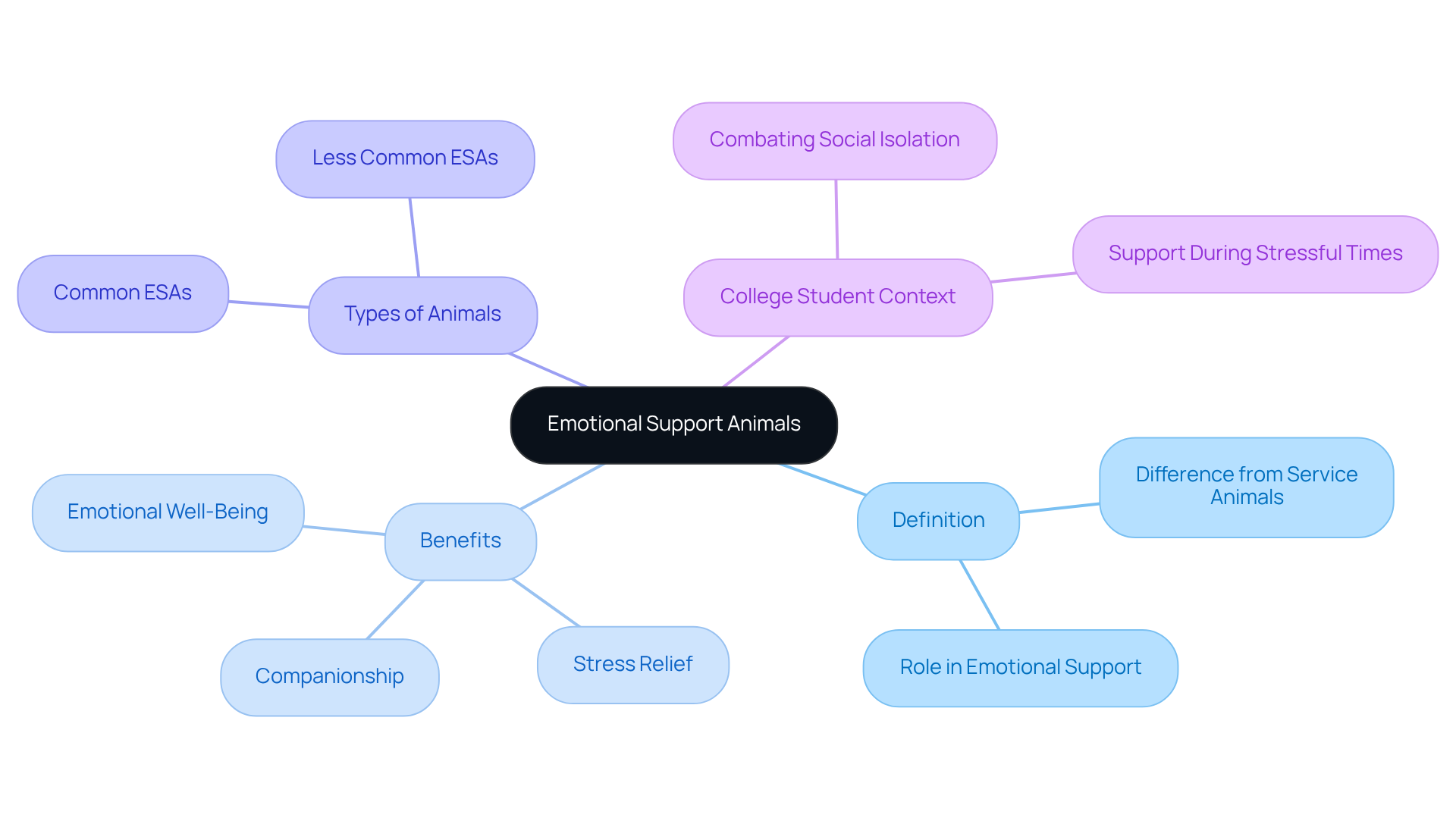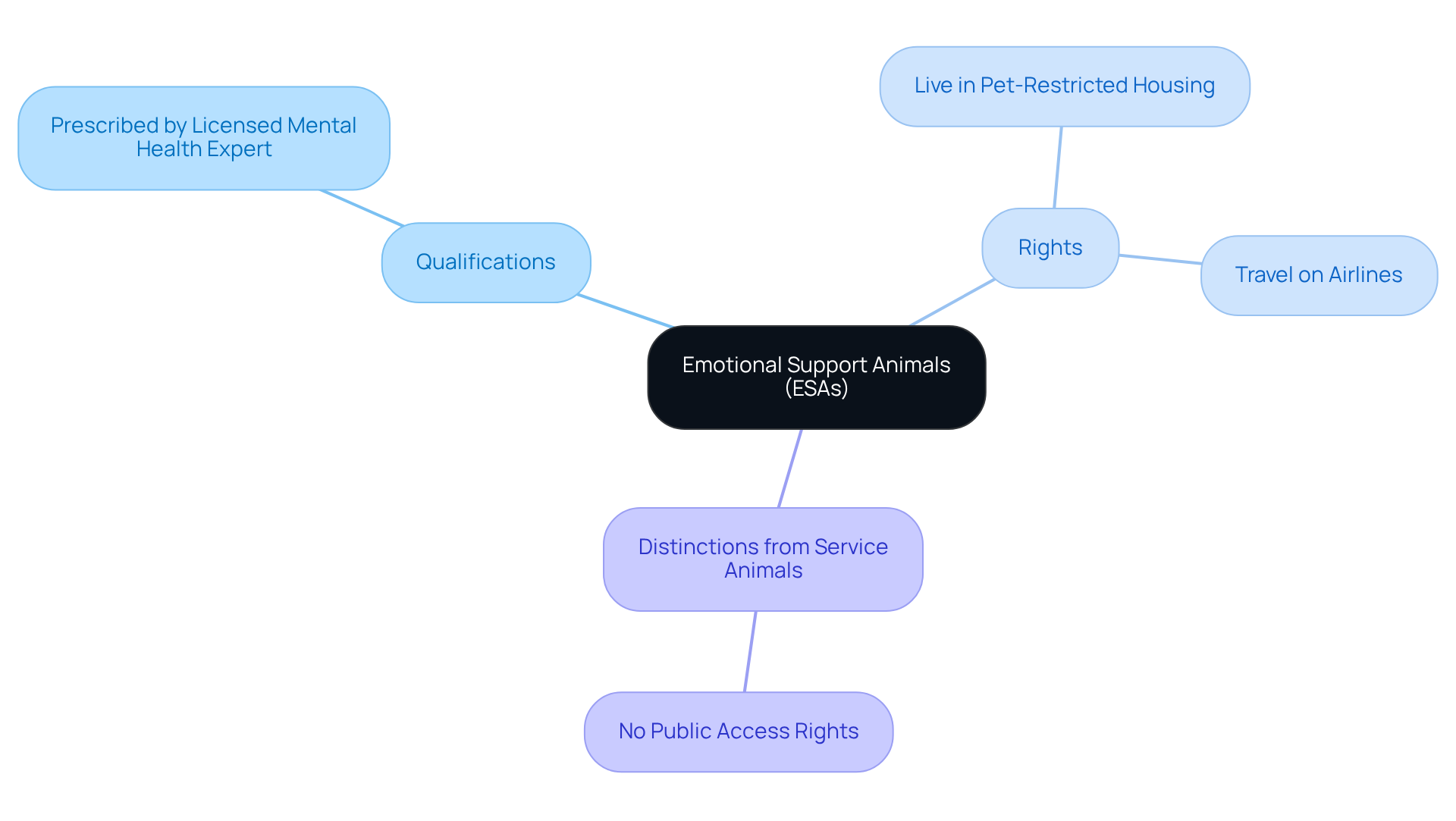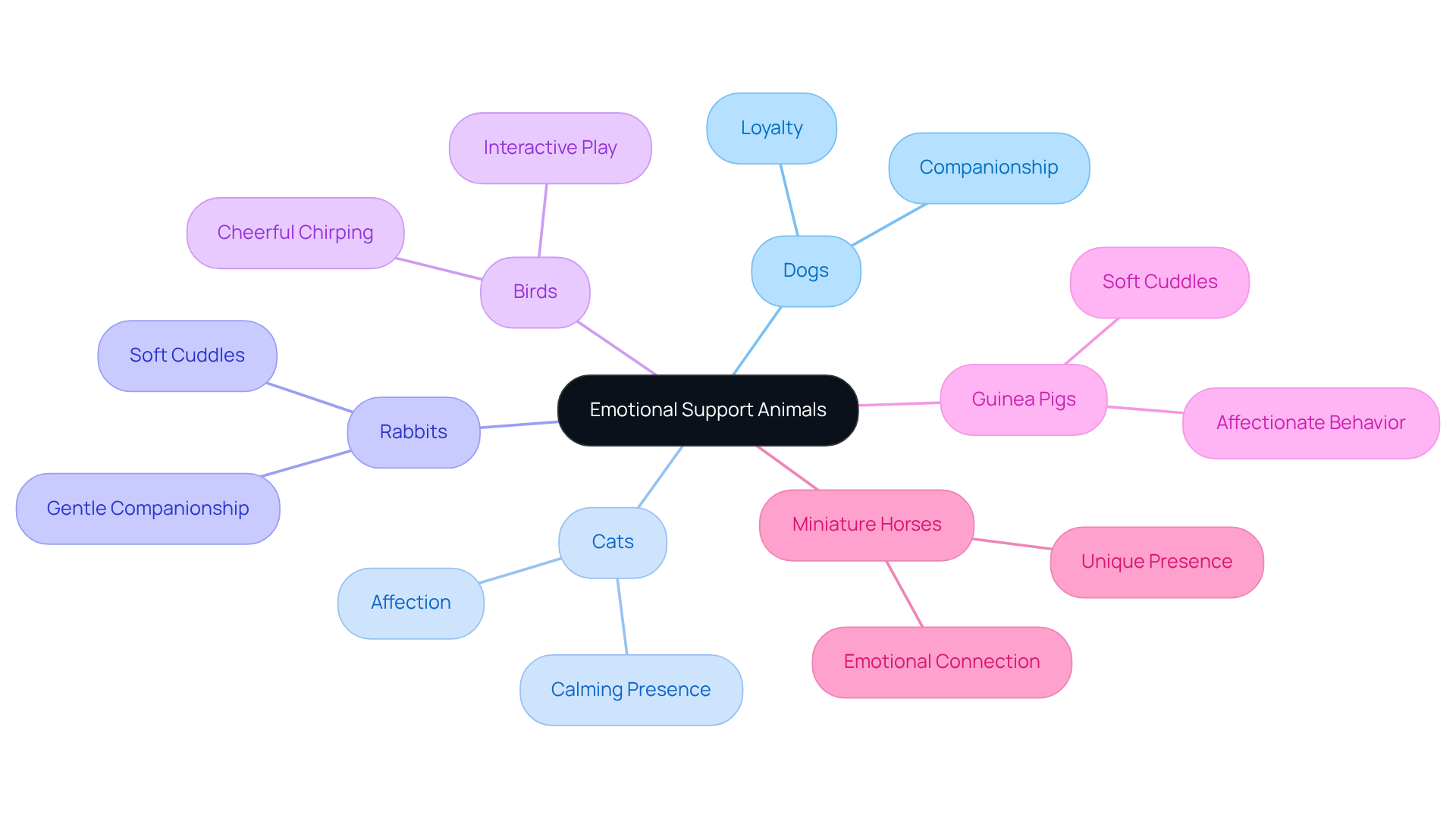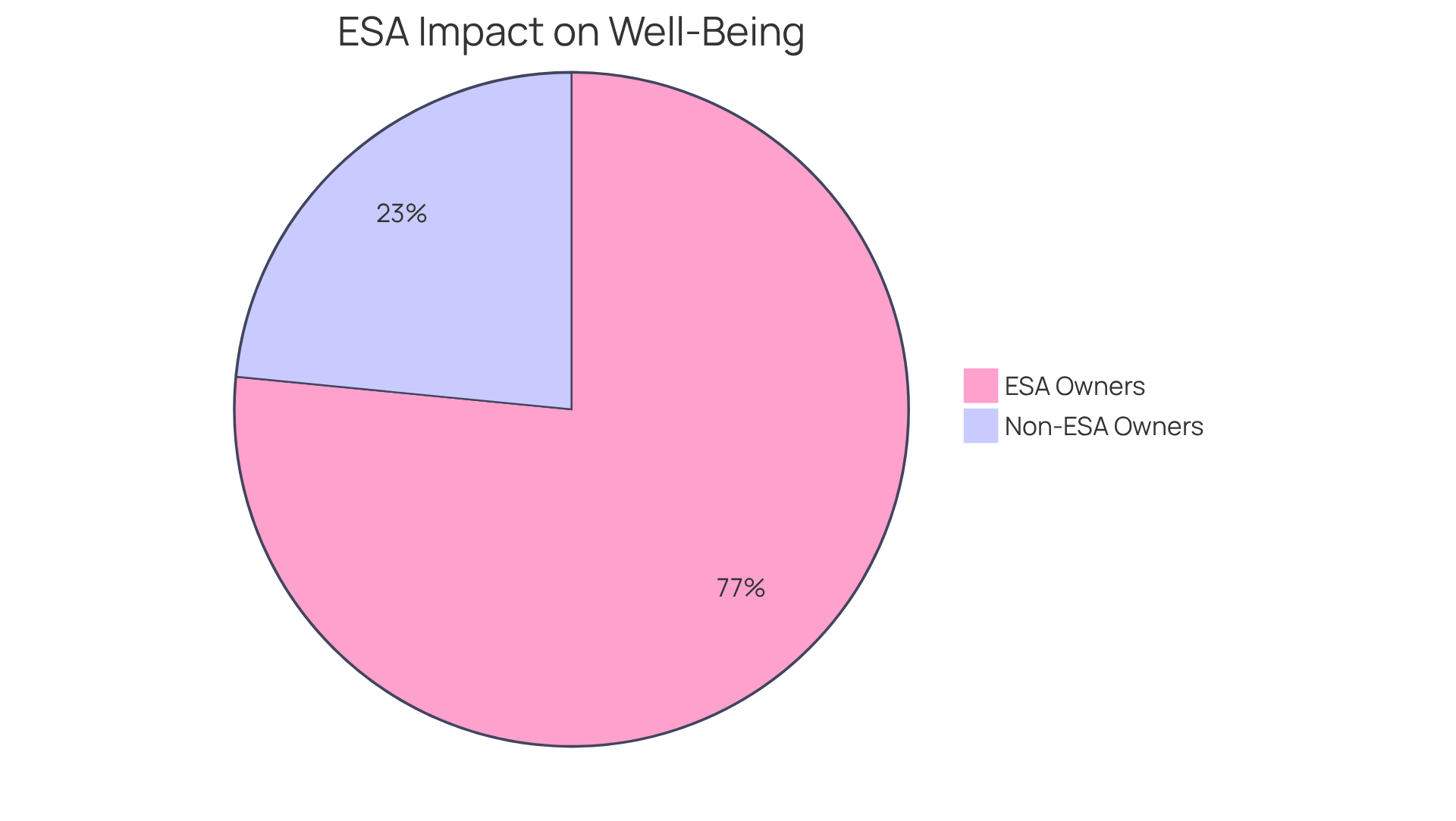

What Animals Qualify as Emotional Support Animals?
by Lena Park
Last updated: September 4, 2025
Verified and Approved by:
Angela Morris,
MSW, LCSW
Fact Checked

Overview
Animals that qualify as Emotional Support Animals (ESAs) encompass a range of beloved pets, including:
- Dogs
- Cats
- Rabbits
- Birds
- Guinea pigs
- Miniature horses
These animals are cherished companions that provide vital emotional comfort and support to their owners. It’s important to recognize that the primary requirement for an animal to be considered an ESA is its ability to alleviate symptoms associated with emotional or psychological distress. This qualification is often determined through a heartfelt prescription from a licensed mental health professional, who understands the unique struggles that individuals face. By acknowledging these challenges, we can appreciate the profound impact that ESAs have on enhancing emotional well-being.
Introduction
In today’s fast-paced world, understanding the role of Emotional Support Animals (ESAs) in providing comfort and companionship is increasingly vital. These remarkable animals, unlike trained service animals, offer emotional relief to individuals grappling with mental health challenges, from anxiety to depression.
Have you ever felt overwhelmed by these feelings? It’s important to recognize that you are not alone in this struggle.
A pressing question arises: which animals qualify as emotional support animals? Exploring the diverse range of eligible animals not only underscores the significance of companionship in healing but also addresses the legal rights and benefits that accompany having an ESA, especially in high-stress environments like college campuses.
Remember, the support you seek is available, and ESAs can be a nurturing part of your journey towards emotional well-being.
Define Emotional Support Animals
Emotional Support Animals (ESAs) are beloved pets that provide comfort and assistance to individuals grappling with emotional or psychological distress, raising the question of what animals qualify as emotional support animals. Unlike service animals, which are trained to perform specific tasks for those with disabilities, ESAs do not require specialized training. Their primary role is to offer companionship and help alleviate symptoms of mental health conditions such as anxiety, depression, and PTSD, leading to inquiries about what animals qualify as emotional support animals.
For college students, the presence of an ESA can be especially beneficial. These animals serve as a steady source of comfort during high-stress situations, helping to ease anxiety or depressive episodes and bridging the emotional gap often caused by social isolation. They play a crucial role in stress relief, providing a calming presence that assists students in managing the pressures of academic life.
Understanding what animals qualify as emotional support animals can significantly enhance the connection between a person and their ESA, thereby improving emotional well-being. In the challenging atmosphere of college life, many individuals find that what animals qualify as emotional support animals are essential for therapeutic companionship. Have you ever felt overwhelmed by the demands of school? The love and support of an ESA can make a world of difference, reminding us that we are not alone in our struggles. With the right support, including an ESA letter, individuals can find a nurturing path toward emotional healing and stability.

Understand Legal Qualifications and Rights
Navigating the challenges of emotional or psychological conditions can be incredibly difficult. For many, the companionship of an Emotional Support Animal (ESA) raises the important question of what animals qualify as emotional support animals to provide much-needed comfort and stability. To understand what animals qualify as emotional support animals, it is essential that the animal is prescribed by a licensed mental health expert as part of a treatment plan tailored to the individual’s needs. This compassionate approach recognizes the importance of emotional support in healing.
Under the Fair Housing Act (FHA) and the Air Carrier Access Act (ACAA), individuals with valid ESA letters are granted specific rights. These include:
- The ability to live with their emotional support animals in pet-restricted housing
- The ability to travel with them on airlines without incurring extra charges
Such provisions can significantly alleviate the stress and anxiety that often accompany mental health challenges.
However, it is vital for ESA owners to understand that while these animals are protected under these laws, they do not possess the same access rights as service animals in public spaces. This distinction can sometimes lead to confusion, but knowing the limitations can empower ESA owners to navigate their rights more effectively. Remember, you are not alone in this journey; support is available, and understanding your rights can help foster a nurturing environment for both you and your ESA.

Identify Eligible Animal Types for ESAs
While dogs and cats are often seen as the most common Emotional Support Animals, it’s important to understand what animals qualify as emotional support animals, as a variety of other animals can also provide the comfort and emotional support that many individuals need. Imagine the gentle companionship of rabbits, the cheerful chirping of birds, the soft cuddles of guinea pigs, or even the unique presence of miniature horses. Depending on their personal needs and the guidance of their care provider, individuals may find that each of these animals can play a vital role in helping them cope with their emotional challenges, particularly in understanding what animals qualify as emotional support animals.
The key factor is that the animal must truly offer emotional support and comfort, which is essential for alleviating symptoms related to one’s condition, making it important to understand what animals qualify as emotional support animals. For those considering becoming an ESA owner, it is crucial to seek guidance from a psychological care provider. They can help identify the most appropriate animal for your unique emotional requirements. This thoughtful approach ensures that you can fully appreciate your living experience, especially in university accommodation, where the presence of an ESA can make a significant difference in your daily life.

Explore Benefits of Emotional Support Animals
Emotional Support Animals (ESAs) offer numerous advantages that significantly enhance their owners’ psychological well-being and overall quality of life. They alleviate feelings of loneliness, foster a sense of safety, and contribute to emotional stability. Research reveals that the presence of an ESA can effectively reduce anxiety levels, providing comfort during stressful moments and encouraging social engagement. For instance, a study found that:
- 62% of ESA owners reported improved well-being during the pandemic.
- In stark contrast, only 19% of non-ESA owners experienced similar benefits.
This underscores the vital role that emotional support animals play in psychological care.
The physiological effects of interacting with animals are profound; engaging with an ESA can trigger the release of oxytocin, a hormone associated with bonding and stress relief. This biological response not only strengthens emotional connections but also promotes relaxation and well-being. Real-life experiences further illustrate these benefits: individuals with emotional support animals often report a significant decrease in anxiety and loneliness. According to a survey conducted by Pettable:
- 73% of pet owners rated their pets’ effectiveness in enhancing well-being as eight or higher on a scale of ten.
- Furthermore, 41% of those without an emotional support animal indicated that their well-being declined during the pandemic.
This highlights the positive influence of emotional support animals compared to non-owners. Such statistics emphasize the essential role ESAs play in the lives of those navigating mental health challenges, making them an invaluable part of many individuals’ therapeutic strategies.

Conclusion
Emotional Support Animals (ESAs) play a crucial role in providing comfort and companionship to those grappling with emotional or psychological challenges. It’s important to understand the qualifications and types of animals that can be classified as ESAs for those seeking support. Unlike service animals, ESAs do not require specialized training; however, they must be prescribed by a licensed mental health professional to ensure they meet the emotional needs of their owners.
This article has highlighted key points, including:
- The legal rights associated with ESAs
- The variety of eligible animal types
- The numerous benefits they offer
From dogs and cats to rabbits and miniature horses, each animal can uniquely contribute to emotional stability and well-being. Furthermore, understanding the legal framework surrounding ESAs is essential, as they can have a significant positive impact on mental health, particularly in high-stress environments like college campuses.
The presence of an ESA can truly transform the lives of individuals facing emotional difficulties. They foster a sense of connection and can effectively reduce feelings of loneliness and anxiety. As our understanding of emotional support animals continues to evolve, it is vital for potential ESA owners to seek guidance from mental health professionals and stay informed about their rights and responsibilities. Embracing the companionship of an ESA could be a pivotal step towards achieving emotional healing and stability, ultimately enriching the lives of those who need it most.
Frequently Asked Questions
What are Emotional Support Animals (ESAs)?
Emotional Support Animals (ESAs) are pets that provide comfort and assistance to individuals experiencing emotional or psychological distress. Their primary role is to offer companionship and help alleviate symptoms of mental health conditions such as anxiety, depression, and PTSD.
How do ESAs differ from service animals?
Unlike service animals, which are trained to perform specific tasks for individuals with disabilities, ESAs do not require specialized training. Their main function is to provide emotional support and companionship.
What animals can qualify as Emotional Support Animals?
Various animals can qualify as Emotional Support Animals, but the article emphasizes the importance of understanding the connection between a person and their ESA to enhance emotional well-being.
How can ESAs benefit college students?
ESAs can be particularly beneficial for college students by serving as a steady source of comfort during high-stress situations, helping to ease anxiety or depressive episodes, and bridging the emotional gap caused by social isolation.
What role do ESAs play in managing academic pressures?
ESAs provide a calming presence that assists students in managing the pressures of academic life, contributing to stress relief and emotional support.
How can an ESA letter assist individuals?
An ESA letter can provide official recognition of an Emotional Support Animal, allowing individuals to seek the therapeutic companionship that can lead to emotional healing and stability.
Certify Your Emotional Support Animal Today

Why You Can Rely on Us?
At Wellness Wag, we believe your pet deserves care rooted in both science and compassion. Each article is carefully researched, written in clear language for pet owners, and then reviewed by qualified professionals to ensure the information is evidence-based, current, and practical for real-life care. Our goal is to help you feel confident in making informed decisions about your pet’s health and well-being.
Reviewed by
Angela Morris, MSW, LCSW
Angela is a licensed clinical social worker with 20 years of experience in patient advocacy and community mental health. She has assisted numerous clients with ESA evaluations and brings a deep understanding of disability accommodations, ensuring that all information is accurate, supportive, and practical.

Written by :
Lena Park
Last Updated :
September 4, 2025












